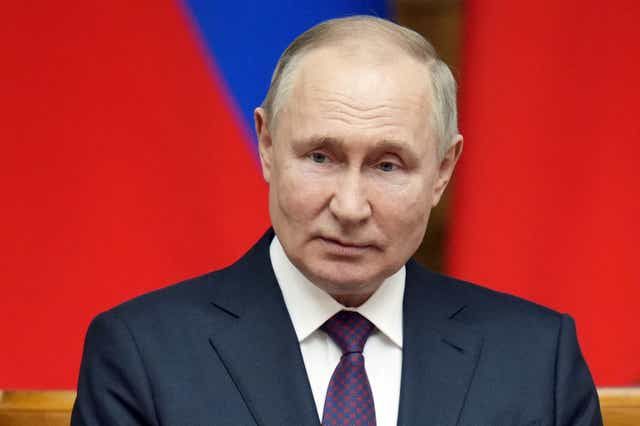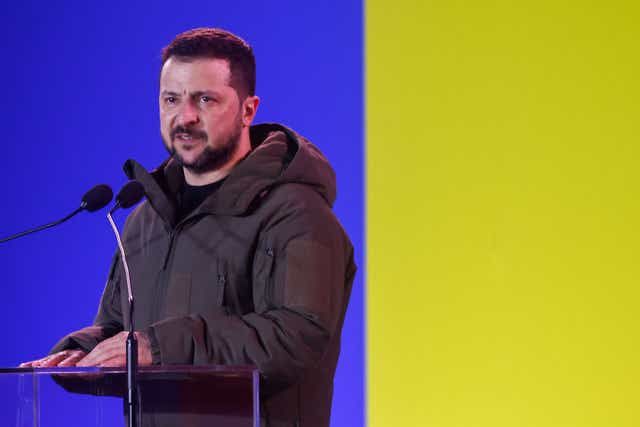Ukraine denies alleged attack on Russian president which reportedly saw two drones brought down over the Kremlin
Ukraine has denied attacking the Kremlin with drones overnight in a failed bid to assassinate President Vladimir Putin.
Russia said on Wednesday two drones had been used in the alleged attack on Putin’s residence in the Kremlin citadel, but had been disabled by electronic Russian defences before they could strike.
But Kyiv has firmly denied the accusation - the most serious that Moscow has levelled in more than 14 months of war - which it said would “allow Russia to justify massive attacks on Ukrainian cities”.
In a statement, Ukraine’s president Volodymyr Zelensky said: “We don't attack Putin or Moscow. We fight on our territory. We're defending our villages and cities.”
The Kremlin has alleged debris from the devices fell on the grounds of the seat of Russia’s government but did not cause any damage. The statement, which did not explain what caused the drones to break up, said no casualties were reported.
The Kremlin said it considered the attack an act of terrorism and reserved the right to retaliate, state-run RIA news agency reported.
“We regard these actions as a planned terrorist act and an attempt on the president’s life, carried out on the eve of Victory Day, the May 9 Parade, at which the presence of foreign guests is also planned.
“The Russian side reserves the right to take retaliatory measures where and when it sees fit.”
Kyiv categorically denied involvement in the attack.
 Vladimir Putin
Vladimir Putin
“We do not attack the Kremlin because, first of all, it does not solve any military problems,” Ukraine’s presidential advisor, Mykhailo Podolyak, said on Wednesday afternoon.
“This is extremely disadvantageous from the point of view of preparing our offensive measures.
“And most importantly, it would allow Russia to justify massive strikes on Ukrainian cities, on the civilian population, on infrastructure facilities. Why do we need this?”
The US secretary of state said he could not validate Russia's accusation that Ukraine tried to assassinate Putin, but he would take anything coming from the Kremlin with a “very large shaker of salt."
Asked if the United States would criticise Ukraine if it decided on its own to strike back in Russian territory, Antony Blinken said those were decisions for Ukraine to make about how to defend itself.
Kremlin spokesman Dmitry Peskov told RIA that Putin wasn’t in the Kremlin at the time of the alleged attack, and was working from the Novo-Ogaryovo residence.
 President Zelensky has denied any role in the attack
President Zelensky has denied any role in the attack
Putin was not injured, and there was no material damage to the Kremlin buildings, the Kremlin said, adding that the President’s schedule was unchanged following the incident.
"The Russian side reserves the right to take retaliatory measures where and when it sees fit," it said.
An unverified video circulating on Russian social media including the channel of the military news outlet Zvezda showed pale smoke rising behind the main Kremlin Palace in the walled citadel after the purported incident.
According to text accompanying the video, residents of a nearby apartment building reported hearing bangs and seeing smoke at around 2.30am local time. It was not possible to independently verify the posted footage.
The Kremlin didn’t present any evidence from the reported incident, and its statement included few details.Kremlin spokesman Peskov said a military parade would take place as scheduled on Thursday, when Russia will hold its annual Victory Day celebrations.
Victory Day is a key anniversary for President Vladimir Putin, commemorating the Soviet Union’s victory over Nazi Germany during the Second World War.
But Russia has reportedly already scaled back this year’s festivities, citing concerns they could be targeted by pro-Ukrainian saboteurs.















